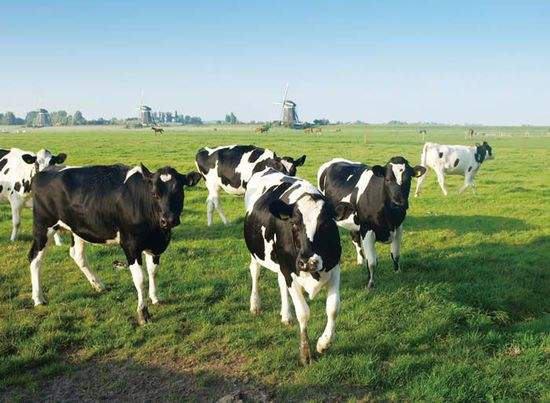(单词翻译:单击)
听力文本
This is Scientific American — 60-Second Science. I'm Christopher Intagliata.
The square footage of a home tends to be a measure of wealth. Compare the sizes of dwellings in a city and you'll get begin to get a picture of rich and poor, and how wealth is distributed.
Now researchers have used that modern metric on ancient settlements. They investigated housing-based wealth at 63 archaeological sites, from Old World places like Mesopotamia to New World sites like Mesa Verde in Colorado.
As expected, the wealth differential widened as agriculture took off. And it kept growing in the Old World. But in the Americas the gap suddenly stopped growing about 2500 years after the first crops showed up.
"Well, this was a surprise first of all." Timothy Kohler is an archaeologist at Washington State University. His team's hypothesis for the differences between hemispheres? The Old World had large domesticated animals—and that they say was a game changer.
"Because if you have a team of oxen available, then you can farm much further from your house, and you can also farm much more land, and raise your income quite dramatically." That sort of farming is land-hungry, he says. So, over time, landowners with beasts of burden got richer at the expense of landless peasants.

The study is in the journal Nature.
Kohler says it's harder to scrutinize the holdings of the wealthy today, in an age of shell companies and offshore accounts. But he has this tip for future archaeologists:
"My advice to them would not be to look just at their main residence, but if they have residences in New York City or in the Bahamas or whatever, they need to add up all those residences and attribute them correctly to a single household."
Given the modern-day stats on the wealth gap, they'll probably uncover a society even more unequal than the ancient Old World.
Thanks for listening for Scientific American — 60-Second Science. I'm Christopher Intagliata.
参考译文
这里是科学美国人——60秒科学。我是克里斯托弗·因塔利亚塔。
住宅的大小往往可以衡量财富。比较一下城市中各个住宅的大小,你就可以明白穷人和富人的差别,以及财富的分配方式。
现在,研究人员用现代度量标准测量古代住宅。他们对63个考古遗址的房产进行了调查,从古代世界的美索不达米亚平原到位于科罗拉多梅萨维德国家公园这样的新世界遗址。
正如所料,随着农业的发展,贫富差距不断扩大。而且在旧世界也不断增长。但是在美洲,在第一批农作物出现后的2500年后,这种差距突然停止增长。
“首先,这是一个惊喜。”华盛顿州立大学的考古学家蒂莫西·科勒说道。他的团队就南北半球差异所提出的假设是什么?旧世界有大型驯养动物——而这成为了游戏规则改变者。
“因为如果有一群牛,你就可以在家种植更多庄稼,耕种更多土地,进而大幅提高你的收入。”他说,这种耕作方式以土地为根本。所以,随着时间的推移,拥有大量牲畜的土地主通过剥削无地农民来变得更加富有。
这项研究结果发表在《自然》期刊上。
科勒表示,在这个空壳公司和海外账户盛行的时代,现在很难对富人的财产进行审查。但是他对未来的考古学家提出了以下建议:
“我给他们的建议是,不要只关注富人的主要住所,如果他们在纽约市或巴哈马群岛或其他地方有住宅,那需要把所有住宅都算上,准确地归纳在单个家庭的财产中。”
考虑到当代贫富差距的统计数据,他们可能会发现一个比古代世界更不平等的社会。
谢谢大家收听科学美国人——60秒科学。我是克里斯托弗·因塔利亚塔。
译文为可可英语翻译,未经授权请勿转载!
重点讲解
重点讲解:
1. take off (产品、活动、事业等)腾飞,突然成功;
例句:I think boxing will take off in a big way here.
我想拳击运动在这儿会有很大的发展。
2. show up 出现;
例句:When he eventually did show up, it was obvious to all that he had changed his original idea.
当他最终出现时,所有人都清楚他已经改变了他最初的想法。
3. at the expense of 以牺牲…的利益为代价;
例句:The dealers profited shamefully at the expense of my family.
这些经销商通过损害我家人的利益不光彩地赚钱。
4. add up 加;增加;
例句:Add up all the income you've received over the period in question.
把那个时期里你拿到的所有收入加在一起。


